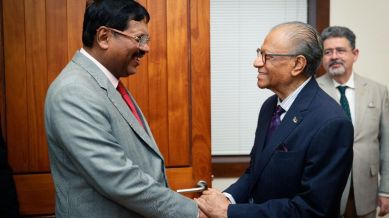Ananthakrishnan G. is a Senior Assistant Editor with The Indian Express. He has been in the field for over 23 years, kicking off his journalism career as a freelancer in the late nineties with bylines in The Hindu. A graduate in law, he practised in the District judiciary in Kerala for about two years before switching to journalism. His first permanent assignment was with The Press Trust of India in Delhi where he was assigned to cover the lower courts and various commissions of inquiry. He reported from the Delhi High Court and the Supreme Court of India during his first stint with The Indian Express in 2005-2006. Currently, in his second stint with The Indian Express, he reports from the Supreme Court and writes on topics related to law and the administration of justice. Legal reporting is his forte though he has extensive experience in political and community reporting too, having spent a decade as Kerala state correspondent, The Times of India and The Telegraph. He is a stickler for facts and has several impactful stories to his credit. ... Read More
Supreme Court ruling sent message about rule of law, not bulldozer: CJI Gavai

Chief Justice of India B R Gavai Friday said the Supreme Court’s judgement laying down guidelines for demolition of dwelling units “sent a clear message that the Indian legal system is governed by the rule of law, not by the rule of the bulldozer”.
The CJI, who is on a three-day official visit to Mauritius, was delivering the ‘Inaugural Sir Maurice Rault Memorial Lecture 2025’ on the subject ‘Rule of Law in the Largest Democracy’. During his visit, he met President Dharambeer Gokhool, Prime Minister Navinchandra Ramgoolam and other senior officials on Thursday.
monthly limit of free stories.
with an Express account.
During his address Friday, CJI Gavai drew a distinction between “just” and “unjust” law, citing Mahatma Gandhi and B R Ambedkar.
“It is important to remember that just because something is legalised, it does not mean it is just. History offers numerous examples of this painful truth. Slavery, for instance, was once legal in many parts of the world, including the United States of America. In India, colonial legislations such as the Criminal Tribes Act of 1871 branded entire communities and tribes as criminal by birth. Laws across different regions of the world penalised indigenous peoples and marginalised communities, reinforcing systemic injustice. Laws of sedition were often used to suppress resistance against oppressive legal systems,” he said.
The CJI said: “These examples underline that legality alone does not confer fairness or justice. This crucial distinction forms one of the foundations of the Indian Constitution.”
CJI Gavai said that Article 32 of the Constitution embodies the principle that law must serve justice, protect the vulnerable, and ensure that power is exercised ethically.
He said that since the adoption of the Constitution, the concept of the rule of law has evolved far beyond legal texts.
“In the social sphere, laws have been enacted to redress historical injustices, and marginalised communities have frequently invoked these laws, and the very language of the rule of law, to assert their rights against entrenched systems of oppression. In the political arena, the rule of law serves as a benchmark of good governance and societal progress, standing in stark contrast to misgovernance and lawlessness, where institutions and public officials might otherwise evade accountability.”
He added that the rule of law has matured as a guiding principle for the judiciary, shaping its approach to testing the validity of laws and interpreting constitutional mandates.
The CJI referred to four judgements, which, he said, demonstrate how the Supreme Court has developed the rule of law as a substantive principle, “using it to strike down laws that are manifestly arbitrary or unjust”. These were the Shayara Bano case wherein the SC held the practice of Talaq-e-Bidat in Muslim personal law arbitrary, the ruling decriminalising adultery, the 2024 judgement nullifying the remission granted to convicts in the Bilkis Bano case and the decision striking down the electoral bonds scheme.
The CJI is visiting Mauritius at the invitation of Chief Justice Mrs Rehana Bibi Mungly-Gulbul. He took part in the celebrations organised at the Mahatma Gandhi Institute (MGI) as part of Gandhi Jayanti. CJI Gavai accompanied by his family paid floral tributes at the Gandhi statue.
MGI is a joint initiative of the two countries and promotes Indian culture.
President Gokhool and CJI Gavai discussed India-Mauritius relations, including the strong educational partnership and ties between judicial institutions.
The CJI also discussed with Prime Minister Ramgoolam, the vibrant cultural connect and people-to-people ties underpinning relationship, officials said, adding that the PM fondly spoke about his recent successful state visit to India.
CJI Gavai also met the Deputy Prime Minister Paul Berenger.
The Chief Justice of Mauritius also hosted an official dinner in honour of CJI Gavai.